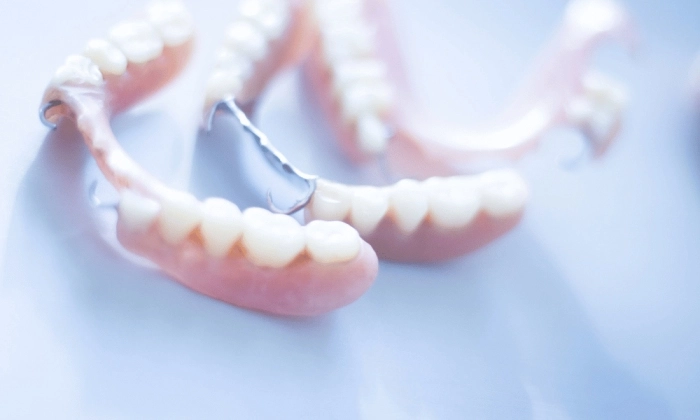A gap in your teeth may decrease your confidence in your smile. If you have lost only a few teeth, partial dentures may be the answer to restore your smile. Partial dentures are removable dentures that will complete your smile, improve chewing efficiency, and stop your other teeth from moving.
At Smile & Shine Dental, we employ highly trained professionals to provide you with the best partial dentures so that you can smile naturally. This blog will explain what partial dentures are, how they work, the cost, and care tips.
What are Partial Dentures?
When patients only experience the loss of a few teeth, partial dentures are one of the most universally used treatments. Partial dentures help to keep a patient’s smile aesthetically pleasing, healthy, and functioning.
Partial dentures are customized dental restorations that both feel and appear natural. According to desire and necessity, patients are provided with removable or fixed partial dentures.
Types of Partial Dentures
Partial dentures come in various models depending on a patient’s particular dental condition and requirements. The two most commonly utilized partial dentures are:
- Removable Partial Dentures: Removable partial dentures are taken out for cleaning and are retained by clasps or precision attachments.
- Fixed Partial Dentures: Fixed partial dentures provide a relatively more fixed option. These types of dentures anchor dental bridges with cemented teeth and are not removable.
How Do Partial Dentures Work?
Partial dentures work by filling in gaps of lost teeth. Partial dentures are attached to a patient’s remaining natural teeth in a stable and supportive way. Removable partial dentures involve the use of clasps, whereas fixed partial dentures are cemented permanently on adjacent teeth for a firm grip. These dental appliances distribute chewing forces evenly so that no excessive force is on natural teeth.
Partial dentures vs. complete dentures
Understanding partial dentures vs full dentures will help to determine the correct choice for your dental requirements. Partial dentures are held firmly among remaining teeth, while full dentures are for those who have lost all their teeth. Complete dentures sit on gums, but partial dentures sit on natural teeth.
Materials Used in Partial Dentures
Partial dentures may be designed with a combination of materials, including:
- Metal Partial Dentures: Metal partial dentures are made of Cobalt-chromium; these dentures are alloy-based, strong, and resistant.
- Acrylic Partial Dentures: Acrylic partial dentures are less resistant than metal, but are often more cost-effective.
- Flexible Partial Dentures: These dentures are pliable, thermoplastic, or based on nylon, and cosmetic.
You can decide between metal vs. acrylic partial dentures based on costs, durability, and preference.
Advantages of Partial Dentures
Partial dentures have numerous advantages, which include:
- Restore chewing and speech function.
- Improve your smile.
- Prevent the movement of existing teeth.
- Affordable tooth replacement solutions.
- Adjustable partial solutions for comfort and a better fit
Partial Dentures Cost
The cost of partial dentures will depend on a variety of factors, including:
- Type of material utilized.
- Number of teeth to be replaced.
- Dental clinic location.
- Type of Denture (fixed or removable).
Partial dentures tend to range from $500 to $2,500 for an arch. The most suitable partial dentures for missing teeth should provide the patient balance between cost and lifespan.
Alternatives to Partial Dentures
There are numerous alternatives to partial dentures. Some other options include:
- Dental Implants: Implants are long-lasting and have a natural look, but can be costly.
- Dental Bridges: They are fixed bridges that are supported by abutment teeth.
- Complete Dentures: These are for those who have no natural teeth.
Partial denture options are based on price, oral hygiene, and desire.
How to Care for Partial Dentures
Proper care ensures that your partial dentures stay in good condition and feel comfortable. Partial denture maintenance entails:
- Denture cleaner for daily cleaning.
- Avoid washing dentures with hot water. Brush your gum and natural teeth regularly to prevent decay. Visit your dentist for adjustments.
Common Problems with Partial Denture & Solutions
Some patients experience problems with partial dentures. The most prevalent issues are:
- Pain or Discomfort: Usually, with new dentures, adjustments can be made to fix potential pain.
- Eating Problem: You can start with soft food and gradually move towards more complex foods.
- Speech Difficulty: Practicing speaking with dentures regularly to get used to wearing them in the long term.
- Loose Fit: Proper adjustments or renewal are necessary once in a while.
- Staining and Odor: Daily cleaning prevents them from accumulating and smelling.
Faqs:
Q. How long do partial dentures last?
Ans: With proper care, partial dentures may last 5-10 years. Regular dental check-ups can further maintain them.
Q. May partial dentures be worn at night?
Ans: No, do not sleep with dentures, as they can cause gum irritation and bacterial activity.
Q. Are partial dentures uncomfortable?
Ans: Partial dentures are not uncomfortable. Although they may feel awkward at first, they will adjust to a patient’s mouth later. Fitting correctly and adjustments are also important.
Q. How frequently do I need to replace my partial dentures?
Ans: Partial dentures must be replaced every 5-10 years because they wear down. Your oral anatomy will also change..
Q. How easy are partial dentures to eat with?
Ans: You can start with soft foods, not sticky or hard foods, until you have acclimated to them.
At Smile & Shine Dental, we provide great partial dentures to help you regain your smile and confidence. You can call us today to learn more about the best partial dentures for missing teeth or schedule your custom partial denture appointment.
